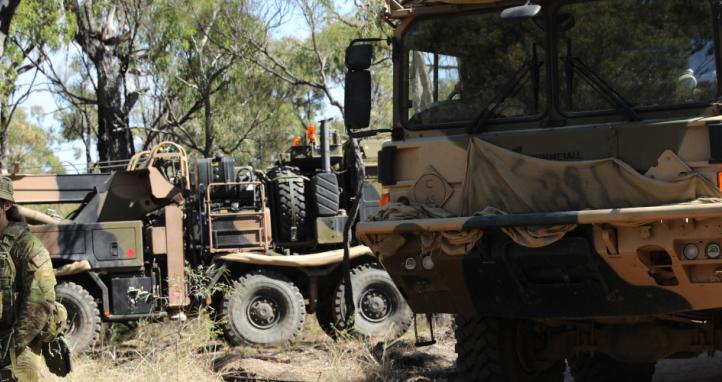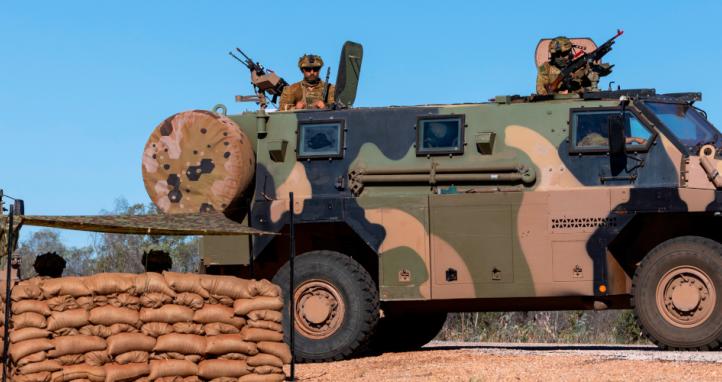This review does not represent any official positions of the US Army or US Department of Defense or the Australian Army or Australian Department of Defence.
If you know the enemy and know yourself, you need not fear the result of a hundred battles.
If you know yourself but not the enemy, for every victory gained you will also suffer a defeat.
If you know neither the enemy nor yourself, you will succumb in every battle.
– Sun Tzu, The Art of War (5th-century BCE)[i]
War is an act of force to compel our enemy to do our will.
War is always the collision of two living forces.
If you want to overcome your enemy you must match your effort against their power of resistance, which can be expressed as the product of two inseparable factors: the total means at their disposal and the strength of their will.
– Carl von Clausewitz, On War (written between 1816-1832)[ii]
The Australian Department of Defence, 2020 Defence Strategic Update and 2020 Force Structure Plan cite, on 83 occasions, the centrality of contributions from our people and our workforce to defence planning, capabilities and modernisation. These citations include:
- People are key to Defence capability.
- The military and civilian personnel of the Defence and Australian Signals Directorate workforce are the most important capability for the defence of Australia and its national interests.
- For Defence to function effectively and adapt to a strategic environment that will be changing more quickly, the way Defence functions to support its frontline capabilities, including its people in uniform, will be as important as the capabilities themselves.[iii]
These Australian Department of Defence’s twenty-first century policies on people and workforce, represent a two-and-a-half millennia continuum of military thinking, including Sun Tzu and Clausewitz quoted above. Clausewitz further identified that war, as a human endeavour, involves ’primordial violence, hatred, and enmity’.[iv] The United States Marine Corps note ‘war is shaped by human nature and is subject to the complexities, inconsistencies and peculiarities which characterise human behaviour’.[v] The Australian Army requires ‘an understanding of the human dimension of war, in particular, the effects of combat on soldiers and human populations’.[vi]
The Journey of You – Be the Hero of Your Own Adventure, authored by Dr Rebecca Jackson, also acknowledges the centrality of people to families, teams, community and life. Emphasising humanity, ‘we are wired for struggle, but also for growth and success’, Dr Jackson states:[vii]
Humans must be courageous. Life is difficult, risky, dangerous and uncertain…[involving] growing up… creating, working, raising families, living and dying.[viii] In the depths of life challenges…[people] are tested physically, emotionally, morally, ethically, spiritually… and [life is] harsh.[ix]
Dr Jackson is an expert in professional leadership and development, a visiting fellow at the Australian War College, monthly contributor to The Leadership Review magazine, published author and speaker. Her specialities include psychology, mental health, leadership and professional development.[x]
Together, the Australian Department of Defence’s 2020 Defence Strategic Update, 2020 Force Structure Plan and Dr Jackson’s The Journey of You are timely opportunities for us to learn and improve ourselves, our families, our people, our teams and our communities to ultimately ‘defend Australia and its national interests’.[xi]
The Journey of You – Be the Hero of Your Own Adventure
>
The Journey of You employs a monomyth, or hero’s journey, framework which ‘mirrors the psychological processes that all humans go through across their lifetimes as they become more emotionally and spiritually conscious’.[xii] In the monomyth framework, our journey:
- Begins with a call to adventure or action.
- Crosses the threshold from our comfort zone (status quo) to our adventure zone (unknown future).
- Challenges, trials and temptations test us as we build our resilience through adversity and become better versions of ourselves…we become someone different.
- Returns when we head back to our clan, tribe, team, village and community, changed and ready to share our story.[xiii]
Employing a conversational style, Dr Jackson provides a map, compass and guide, leading the reader through 12 Chapters, including case studies, to achieve personal growth. Each chapter provides a framework, complete with ideas to ‘Check in With Your Self’ and three suggested actions, to guide the reader on their own personal journey. Dr Jackson seeks to inspire people to reach their personal, professional and cultural potential through encouraging people’s:
Authenticity…reflecting on who they are, what is important to them, how they live in harmony with others, create more than they destroy, nourish their bodies and souls, and leave the planet one day, with few regrets and a pocketful of joyful stories’.[xiv]
The three central themes of The Journey of You are understanding:
1. Who you are: self-knowledge and self-awareness, including your internal resources of:
- Mindfulness – re-framing, re-organising, re-thinking and re-considering ourselves.[xv]
- Curiosity – examining our ‘layers of self-identity’, including motivating our personal continuity and our inner agency of ‘feelings, thoughts, daily behaviours and the way we relate to others’.[xvi]
- Courage – defining our ‘purpose-oriented life’ through self-disciplined ‘purposeful action’ in areas such as ‘compassion, care-giving and generosity’.[xvii]
- Commitment – identifying our ‘core values and self-ideal standards’.[xviii]
2. How to navigate your struggles: self-acceptance.
- What are your skills, knowledge, experience and competence?[xix]
- How does procrastination and perfectionism ‘interfere with your ability to build momentum’?[xx]
- How do you maintain a bias for problem-solving, creative thinking, critical thinking, testing, self-reliance and risk assessment?[xxi]
- When facing adversity, or failure, do you avoid, yield, cope or thrive?[xxii]
- Post-failure do you STOP: Stop; Take a breath; look at Options; and, then Proceed mindfully? [xxiii]
- Is your post-failure mindset that ‘every change you make, every person you meet and every piece of information you absorb comes together so you can create a different outcome in the future’?[xxiv]
3. Finding your true north through self-compassion. What it will take for you to make progress towards a rich, full and meaningful life:[xxv]
- What makes you happy in your life?
- What gives you a sense of mastery?
- What makes you feel fulfilled?
- To what are you committed?
- On a scale from intimate connections to wider-acquaintances, who are the approximately 150 people in your combined clan, tribe, team, village and community?[xxvi]
- Of these 150 people, who are the most significant people in your life?[xxvii] Who are the people:
- You trust.
- Share your interests and passions.
- Compliment your values and beliefs.
- Demonstrate absolute reliability.[xxviii]
- As an element of finding your true north, Dr Jackson encourages you to build a team of five-key people:
- Mentor – a wise guide.
- Coach – challenges and stretches you to learn, grow and adapt.
- Ally – understands you and tells you what you need to hear…not what you want to hear.
- Friend – cares deeply for you and grounds you. You also ground them.
- Champion – maintains a positive outlook on your ability, despite setbacks, to reach your personal, professional and cultural potential.[xxix]
- Finding our true north requires us to ‘nurture relationships, practice non-judgement, show compassion, contribute to others unconditionally and remain authentic’ to strengthen the bonds of connection with those people who matter most.[xxx]
- As Steven Pressfield notes, the ‘zero-sum view of life is that of limited resources’.[xxxi] Instead, Pressfield argues for us to move our relationships from dichotomy – where opinions are only right or only wrong – to non-zero-sum relationships where ‘resources are infinite’. For example:
- The love a parent gives their child (and that the child returns) grows greater, the more each loves. There is and can never be a shortage of love.
- Compassion is infinite.
- Integrity is infinite.
- Faith is infinite.[xxxii]
Conclusion
The Journey of You is an individual story about the reader. The book examines ‘versions of you in the past (your personal history) and the versions of you still to come’ (your future).[xxxiii] Ultimately, the book aims to ‘build better, stronger more compassionate communities and by virtue of this we can live rich, full and meaningful lives’.[xxxiv]
The monomyth and the three themes in The Journey of You are designed for the reader to ‘uncover their sense of purpose and belonging…to see themselves as they truly are…[and achieve] certainty in what they believe, but be open to growth… [and] value-add to the lives of others’.[xxxv] Dr Jackson emphasises that each of us is a ‘work in progress’.[xxxvi]
Finally, measuring completion of The Journey of You ‘circle’, or at least one iteration of a cycle, ‘challenges existing assumption or beliefs’ through focussing on your future, including:
- Permanent or lasting change in your knowledge or behaviour.
- Contributing to the learning of others.
- Enabling future learning.
- Preventing the repetition of mistakes.
- Contributing to your own health and wellbeing.[xxxvii]
As earlier noted, the Australian Department of Defence’s 2020 Defence Strategic Update, 2020 Force Structure Plan and Dr Jackson’s The Journey of You are timely opportunities for us all to learn and improve ourselves, our families, our people, our teams and our communities to ultimately ‘defend Australia and its national interests’.









